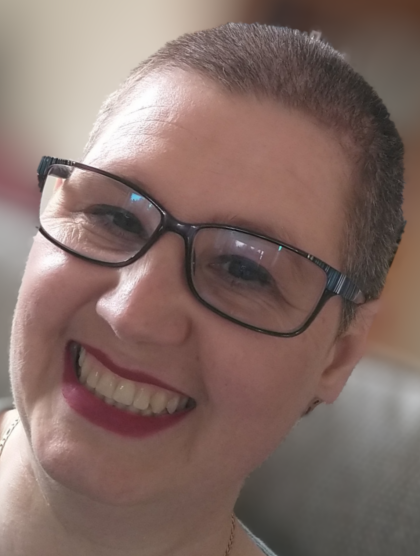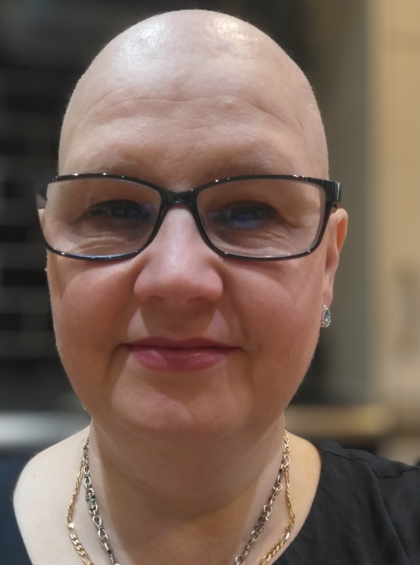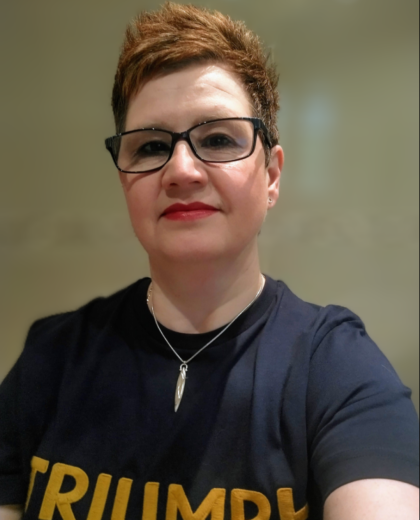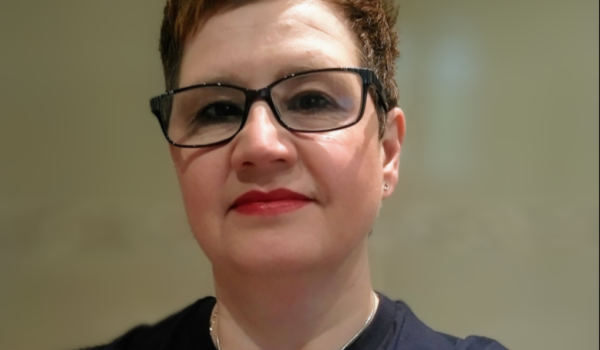When someone tells you that you have cancer, how you process the information is a very individual and personal response. In my case, a million and one thoughts went through my mind.
Why me? What did I do to deserve this? Was it my fault for not taking care of myself? Would this have happened if I'd been fitter, healthier, more active, etc.?
I think these are very normal reactions, however in order to deal with what was to come I had to let go of these thoughts and stop blaming myself. I was not to blame and it was not my fault.
I never asked to have cancer, and I certainly did not want it, but I firmly believe that you either have to accept, and work with, the hand that life deals or else lie down and wait to die.
My experience has forced me to re-evaluate my life and provided me with a new appreciation for the people in it. My family and friends have proved to be a wonderful and crucial support network, even when I was stubborn and wanted to do things on my own. My husband has been my bedrock throughout my journey and I would not be here without his unconditional love and support.
This is my story.

Initial symptoms and diagnosis
I'd just turned 48 and had been on the mini pill for a number of years when I started experiencing vaginal bleeding around March 2022 which was very unusual for me, however due to my age I put it down to pre-menopausal symptoms, and did not initially think anything of it.
After returning from holiday at the end of April I visited my GP as I was still bleeding and by this time it had been constant for around six weeks. Fortunately, my GP was aware of a risk of ovarian cancer and ordered blood tests, including a CA125 blood test, alongside an ultrasound, and referred me to gynaecology.
My CA125 count was over 9,000 compared to a normal upper count of 35 and following diagnostic tests, which included a further ultrasound, CT scan and a CT guided biopsy, I was diagnosed with advanced ovarian cancer in July 2022.
I was told that due to the size of my tumours I would not have surgery straight away, but instead would have chemotherapy to try to shrink them first, and started chemotherapy in August.
Treatment and surgery
I was very fortunate that, other than my first chemotherapy session, I had no ill side effects and continued to work throughout treatment. While I knew I would lose my hair I did not expect it to start to fall out as quickly as it did.
It was two weeks after my first chemotherapy session that it started to come out in handfuls. When it started to come out, I shaved my head which, for me, allowed me to take back some control. What I didn’t really think about was that I would lose not only the hair on my head but my eyelashes and eyebrows as well, which in some ways was worse.
After my first chemotherapy session the bleeding stopped and I now know that the bleeding was caused by the tumours pressing against the lining of my womb and causing the lining to bleed. By this time I had been bleeding for nearly six months.
When I started chemotherapy, I consented to genetic testing and the results arrived in October. They confirmed that I have an alteration in a BRIP1 gene which can increase a woman's chance of getting ovarian cancer.
In one sense this was a relief to hear as I had been on the contraceptive pill for 30 years and I knew that this was one way to reduce your risk, but I still got it and did wonder why. The only thing was that it would mean my family being tested also due to the chances of the mutation being passed on through parent/sibling relationships.
Following four rounds of chemotherapy I was deemed suitable for surgery and a hysterectomy was booked for November.
Unfortunately, when they started to operate, they realised that the disease was more extensive that the scans had shown and involved both the pelvis and the upper abdominal area, with the result being that they could not operate at that time and instead required a multi-team approach.
Being told that the surgery was unsuccessful was the last thing I thought I would hear and it came completely out of the blue. Initially I was very calm but once I had time to process this information, I became apprehensive and was scared that the same thing would happen next time. However, the medical team quickly confirmed that they would look to operate again when the required surgeons were all available which I found very reassuring.

The plan was always that I would have further chemotherapy after my surgery so I had my final two sessions in December and in early January I received a new date for surgery in February 2023.
I went to see Dr Lindsay in early February, for my pre-surgery consultation, to go over the more advanced surgical procedure that was now required and consent to all the potential surgical interventions and risks involved.
Fast forward to the end of February and upon entering the Glasgow Royal Infirmary for my surgery I was made to feel completely at ease by the professionalism of all the staff involved, from admission to being taken to theatre.
I also got to meet Professor Jamieson who was the pancreatic and liver surgeon. Like Dr Lindsay he was very reassuring, but also very direct and straightforward, ensuring that I was absolutely aware about the risks involved, however to me the risks were worth taking.
My surgery was much more extensive than normal for ovarian cancer and involved the partial/full removal of several organs including pancreas, colon, spleen and gallbladder as well as the ovaries.
I was in surgery for around 12 hours and had an extended distal pancreatectomy, splenectomy, cholecystectomy, en bloc total abdominal hysterectomy and bilateral salpingo oophorectomy, anterior resection and formation of an end colostomy (stoma).
Following surgery, I was admitted to the high dependency unit where I stayed for two weeks. Unfortunately, I had to go back into surgery after the first week to resite my stoma as it was not working properly but following a second, much shorter, surgery this was resolved.
I knew that I would potentially have a stoma based on my pre surgery consultation and was marked up by the stoma nurse on the morning of surgery for both an ileostomy and a colostomy depending on what was required during surgery.
I ended up having a colostomy, and to say that I initially hated it was an understatement. While I knew it was a necessary part of the surgery that saved my life this did not mean I had to like it. “Charlie” is now part of me and I am grateful to her every day.
When I was diagnosed, I was told the cancer was stage 3c, but I now know that I had widespread stage 4b high grade serous tubo-ovarian cancer with extensive metastases to the whole peritoneal cavity and metastases to the pancreas, the spleen and the colon.
Thankfully the surgery was a success with complete macroscopic resection.
Post surgery
I recovered well from surgery and was even able to take part in a Race for Life 5k in May 2023, exactly three months post-surgery, and the Target Ovarian Cancer Target 50 challenge in January 2024 to raise funds.
The only real post-surgery complication that I encountered was that due to the nature of the pancreas I have a persistent pancreatic fistula with a small amount of pancreatic fluid leaking from the remaining pancreas through a small abdominal wall drain which, at the time of writing this almost one year post surgery, is still in place.
During this period, I've regularly been attending Professor Jamieson's pancreatic clinic at the Glasgow Royal Infirmary, and while on occasion I have been upset and frustrated about this, he's always been very open about the risks of removing the drain too early and has always taken the time to reassure me that it will be removed in time.
My most recent scans still show no evidence of disease and I am now on a parp inhibitor called Olaparib as maintenance treatment. I have had a couple of blood transfusions due to low haemoglobin levels but other than that no adverse side effects.
Sharing my story
I was unaware of ovarian cancer, and symptoms, prior to my diagnosis and treatment. In my case I did not have any of the more common symptoms, such as bloating, abdominal pain, always feeling full, needing to wee more often. Abnormal bleeding was my only symptom.
Perhaps the scariest thing was that I didn't feel unwell and if it wasn't for the bleeding, I wouldn't have contacted my GP making my diagnosis all the more of a shock.
When I was diagnosed, I remember thinking that the worst thing I could be told was that the cancer was stage 4. In retrospect, finding out after surgery that my cancer had been re-graded from 3c to 4b, I was probably unaware of how serious my situation was but now realise how fortunate I've been.

I'm realistic enough to know that ovarian cancer is a tenacious disease and that it may come back at some point, but I have a good team around me and if it comes back then I'll deal with it.
I refuse to dwell on what might happen in the future. I have a new appreciation of, and zest for, life and intend to live it to the full.
I want to share my story to help spread awareness of ovarian cancer and show that a late-stage diagnosis can have a positive outcome. Given the lack of screening tools I want all women to be aware of ovarian cancer and feel confident enough to seek help if they experience any symptoms.
I also want to highlight and promote the extensive and collaborative surgical interventions that I've had to give hope to other women who may be in a similar situation, or who are nervous of major surgery.
All of the surgeons who've been involved in my case are doing fantastic work which not only includes surgical intervention but also advances in innovation and clinical and cancer research.
If I had not had the surgery and Dr Lindsay (Gynaecology Oncology Consultant), Professor Jamieson (Consultant Pancreatic and Liver Surgeon) and Professor Roxburgh (Professor of Colorectal Surgical Oncology) had not joined forces to operate on me, the tumour deposits would have grown bigger, invaded other organs and made me sicker, showing the clear benefits of different specialities joining forces for ovarian cancer surgery.
I can never thank them enough for what they and all that staff at the Glasgow Royal Infirmary from admissions staff to the nurses on the HDU, have done. They have without doubt saved my life.
If you’ve been affected by this story and would like to speak to a specialist nurse, you can call our dedicated support line on 020 7923 5475 or contact us: [email protected]. We're open from 9am until 5pm, Monday to Friday.
If reading this story has helped you, join the Ovarian Cancer Community to connect with more people affected by ovarian cancer: www.targetovariancancer.org.uk/onlinecommunity



